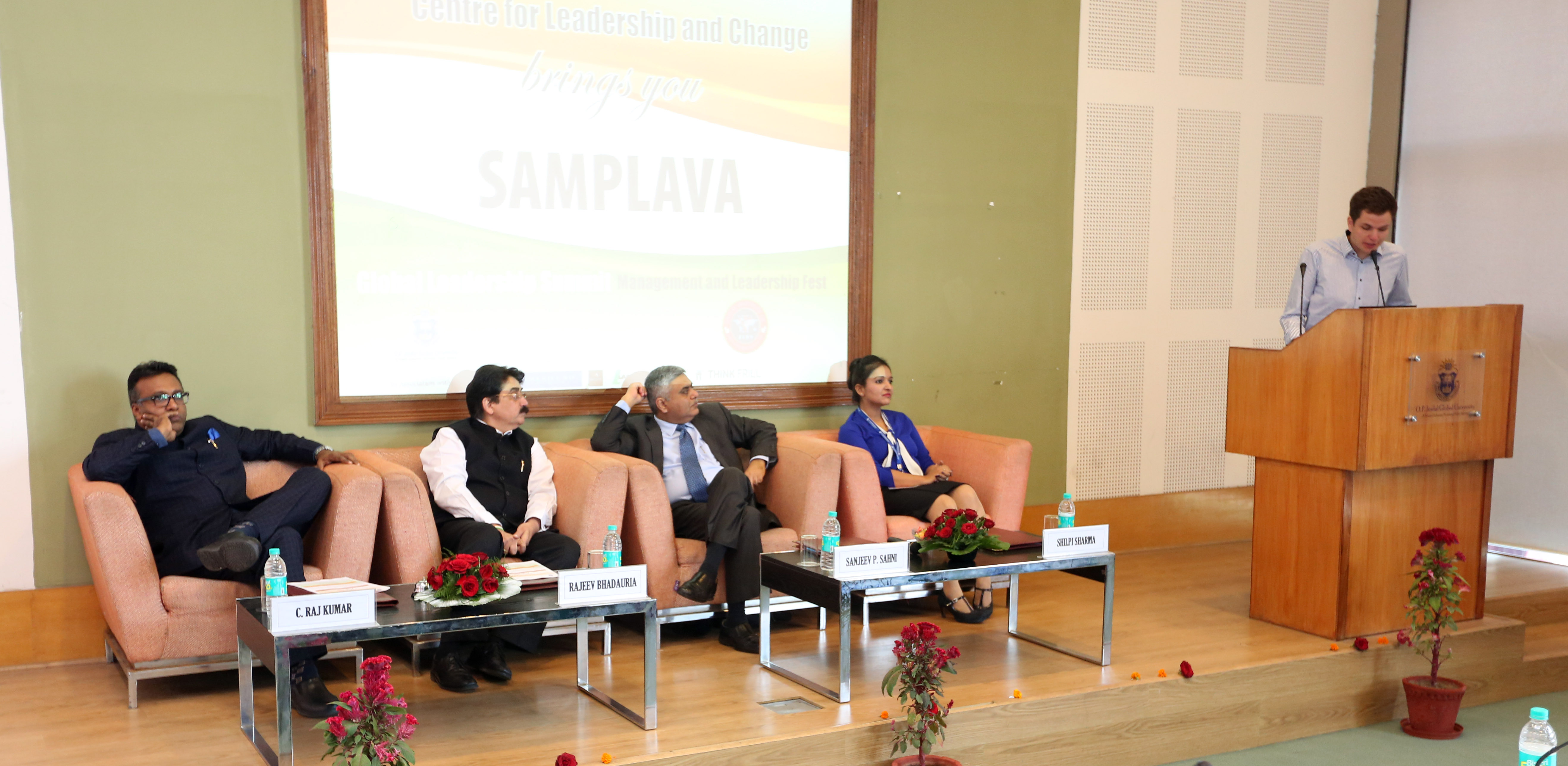Sonipat November 22, 2015
On November, 20 2015, The Centre for Leadership and Change (CLC) at the Jindal Institute of Behavioural Sciences, in collaboration with Jindal Global Business School (JGBS) of the O.P. Jindal Global University held its inaugural Global Leadership Summit and Management Festival, titled, ‘Samplava’, the two day event was organized at the Jindal Global University campus in Sonipat.
The Management festival opened with the inauguration of the Global Leadership Summit. The key themes of the leadership summit included Political Leadership, Civil Society Leadership and Business Leadership, and core discussions centered on ethical leadership, women empowerment in civil society, talent management, role of cultural and education relations leadership in global diplomacy, architecting to manage business complexity among others. The event brought together nineteen outstanding scholars, intellectuals and researchers, both from India and abroad to debate and deliberate upon the said topics.
Professor (Dr.) C. Raj Kumar, Founding Vice Chancellor, O.P. Jindal Global University, delivered a special inaugural address at the forum and spoke on India and different parts of the world facing a leadership crisis in different spheres of society, business and governance. Called for a more nuanced understanding of the issues and challenges being faced, he said, “One of the most difficult challenges we face today is a leadership crisis in all aspects of life, The issue of leadership is central to the future of governance itself and therefore it is imperative for experts and institutions in the world to come together and discuss these issues”
Dr. Sanjeev P. Sahni, Director, Jindal Institute of Behavioural Sciences (JIBS) and Centre for Leadership and Change delivered the welcome address at the conference, he said, “We are delighted to welcome stalwarts from industry and academia from around the world here today, and are hopeful that your discussion and deliberations at this inaugural summit will provide a great opportunity to discuss ways in which investments in leadership, human capital and entrepreneurial innovation will contribute to the development of a strong, sustainable leadership system in society at large.”
Mr. Rajeev Bhadauria, Director Group-HR, Jindal Steel & Power Ltd, delivered a special address at the conclave, he spoke on the continual cycle of change and its impact on businesses, he said, “Change or continual change has become the business driver of today, parameters within and outside the organization are not changing sequentially but simultaneously, therefore the magnitude and complexity of change has become unmanageable. We need to evolve in this kind of an era, that is hyper connected and inter linked and what needs to be changed is our concept of leadership.”
The conference was aimed at debating and helping in creating ideas and solutions in instilling a strong sense of leadership in individuals in the present times of crisis. The world’s pre-eminent thought leaders and academics convened from over seven countries to evaluate critical issues and to introspect into the best practices, in an international backdrop at the Leadership Summit.
Highlighting the importance of ethics in the first session on Political Leadership, Dr. Lorraine Dyke, Associate Dean, MBA Programs, Professor Management and Strategy, Carleton University, Canada, said, “Ethical leadership is one of the most important predictors of police integrity and commitment” “Visibly ethical leaders serve as role models and help establish a culture where Integrity is encouraged.”
While, Richard Everitt, Director Education, British Council India, emphasized the importance of creating transformational working environments within an educational setting that can promote and nurture productive working-relationships and contribute to the success of institution building.
“Business Complexity is real and a leader should be able to solve complexities both by simplifying and by managing complexities or doing both”, said, Professor Djoko Wintro, Dean, Prasetiya Mulya Business School, Indonesia, while delivering his address on Business Leadership: Architecting to manage business complexity.
Highlighting the ideals of leadership and importance of empowering women in civil society, Thilini DeSilva, Lecturer, National Institute of Business Management, Colombo, said, “What a modern leader requires is a blend of intellectual qualities, the ability to think analytically, strategically and creatively accompanied with traits like self-awareness, empathy and humility. I believe, women leaders are more persuasive and adapt well to adversity. They demonstrate an inclusive, team building and problem solving leadership style which is the need of the hour.”
The other distinguished speakers at the conference included Dr. Bernard Heim, Dean of the Faculty of Sciences, Kaizen Learning Expert, German University of Technology in Oman, Dr. Terry Motiuk, Vice Chancellor, Abu Dhabi University and Professor Djoko Wintoro, Dean, Prasetiya Mulya Business School, Indonesia.
Day two of the Inaugural Management fest, titled, ‘Samplava’, was designed as a business and cultural extravagance, a synergy of music, entertainment, food, and dance amid discussions on a variety of business subjects. The entire event was conceptualized and spearheaded by a team of students from the business school of the university under the aegis of Dr. Shilpi Sharma, Director (CLC).
About Centre for Leadership and Change
The Centre for Leadership and Change aims to develop and foster research activities in the field of leadership and change and train and develop young leaders. It also seeks to explore innovative ideas in the field and be the crucible from which all can benefit. To meet these ends it will undertake organize and facilitate, conferences, workshops on current issues, clinics, seminars, working papers by professors, cases studies seminars, lectures and research on leadership and change.

